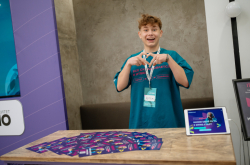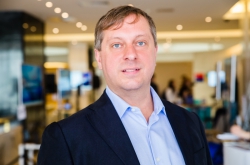When did you first start doing research?
Back in my third year of studies; I worked with Anatoly Shalyto (head of ITMO’s Programming Technology Department – Ed.) on my course paper. This course paper later served as basis for my thesis work, and me and several other students from our department rejoined Prof. Shalyto for our Master’s studies.
This was the beginning of my scientific career. Another important event was the meeting of our department’s students with Bertrand Meyer (Head of Chair of Software Engineering at ETH Zurich, leading expert on software engineering and creator of the Eiffel programming language – Ed.), who later became the scientific supervisor for my PhD. When I was a fourth-year student, he visited ITMO University and talked to us about his work. I was lucky to get into ETH Zurich after I got my Master’s and do my PhD there.

Have you ever thought about leaving science and working at a company? Many talented graduates go that way, for financial reasons among other things.
Of course, I’d considered it, but not for career or financial reasons; it was more about the opinions of my friends. They asked: “How can you do scientific work if you haven’t worked anywhere? You wouldn’t even know what the developers in your field need.” My field is programming languages. I can’t really disagree with that argument – I think it is indeed a great reason to work in the industry. But there’s another issue to consider – if you work in a company, it might be difficult to return to academia.
In my case, the defining factor was the PhD invitation I got from ETH Zurich. I had the opportunity to go to Switzerland, to work with Bertrand Meyer. For me, that opportunity was better than other options. Besides, I’d never felt as if I were sacrificing something by doing my PhD. Postgraduate students are paid well enough in Switzerland – even more than they do in US – so that wasn’t an issue either.
You’ve mentioned the issues of lacking practical experience. Having chosen science, how did you solve that dilemma?
Even before I went to Switzerland, I knew that I love doing science. This is, without exaggeration, my life purpose. But what do we mean by “doing science”? For many in the academia it means an absolute refusal to work at places like Google, to be developers. Personally, I like programming enough that I could probably try my hand at that, too. But I can say with confidence that science is more interesting – especially the field I work in: programming languages and specifically the area of formal methods.

The most important thing and one I like most is that our area combines theory and practice. On the one hand, you get to develop new technology and prove its potential with theoretical methods; on the other hand, you can’t even get published without an actual system to show off. We have to invent and we have to program, which is actually great.
During your PhD in Switzerland, did you continue your previous research or find a new topic to pursue?
To be frank, even after I was accepted, I still didn’t really know what I’d like to do in future. Today’s PhD students, like the ones we’re accepting right now, know exactly what they want. But I didn’t. Having spoken to Bertrand, I learned that there are three fields the specialists at their lab are involved in: program testing, multitasking and program proofing.
I found the latter the most interesting; besides, I’d always been interested in maths and I like it when everything is clean and verified. I went with that choice even though I knew very little what it was about, and had no background knowledge of it.
Over time, I moved into the field of programming languages, although it’s not limited to just that. There are many theoretical aspects to it: how to express various ideas through programming languages, how to make software development easier for programmers, help them spend less time and make less mistakes.

What made you decide to continue your career in the US? How did you get into MIT?
When you get your PhD, you have to make a decision: you either stay in science, become a programmer in the industry or find work as a researcher at some company. I still doubted that I’d want to become a professor in the future, which is why I decided to work as a postdoc.
I assumed, naturally, that this would help me find better work later on. And so, following some advice, I went to the US, because there they just don’t hire people who’ve never worked in the American system. Besides, even the best European schools prefer specialists who have been to the US and know that system.
In that sense, too, I got lucky. It’s very hard to get into MIT if you’re a student; same if you’re a PhD student; and it’s nearly impossible if you’re a professor. For postdocs, however, it’s much easier. There’s a sound explanation for this: few American PhDs want to be postdocs – they either go straight for the professorship or leave the academia. Basically, nobody wants to spend time on a temporary job. However, there is a demand for postdocs – they know how to do science work, and professors always need someone to help them with their projects.
I considered several options in Europe and visited several places in the US. It was my luck that at that moment, MIT had an open postdoc position with the exact professor I wanted to work with. Obviously, MIT is a special place, and I couldn’t say no to this opportunity.
How different is science work in Europe and the US?
The thing is, there are some very different systems in Europe. For instance, the ETH and EPFL (Swiss Federal Institute of Technology in Lausanne) use the American system, so there’s not much difference. But many European universities are different. Germany, for one, has many universities where a young professor has very little chance of getting a position – you either need to know someone, or you’ll remain an assistant professor for years on end.

It’s a different system in the US. It all revolves around the concept of tenure track, which entails six years of work as an assistant professor; at least that’s the term at most universities. Still, despite the title, it’s an independent position: you have your own group, you decide what to work on and what your students will do. After six years, you are evaluated, other professors provide reference letters and, if they decide you’ve done well enough, you’re given a tenure, meaning you can no longer be fired. You become an associate professor and, later on, a full professor.
But it’s obvious from the get-go that this hierarchy is very much a formality, which is why ambitious people appreciate it. As soon as you’re in, you’re your own boss. Sure, there’s the head of department or a dean who tells you how much you need to teach, but in regards to science there’s no one to tell you what to do – you seek out grant money yourself, and decide what you’re going to work on.
Scientists often say that all the bureaucracy that surrounds searching for grants, applying, etc. is the most unpleasant factor. How do you deal with that in teaching and science?
Generally, a professor’s time is split into three main categories: science, teaching, and what you’d call service. The latter includes many things. First, it’s the work you do for your university or department. Like, for example, reviewing the applications from PhD students (which is what I’m doing right now). And it’s not just paperwork. We also review the curriculum, pick new professors. Another sort of work within that category is “outside work”, which includes reviewing journals and conferences. It takes quite a lot of time, but everyone understands that it has to be done. After all, if no one reviewed articles, there’d be no point in conferences.

Here’s one interesting detail. As of late, one unspoken rule of any committee is that women have to be actively present there. But since there aren’t that many women in computer science as compared to men, those of us who are involved have to work much more. There are upsides, too: it’s good if you’re young since you get your name out there, meet new people; it’s useful and gets you prestige. Still, it’s time- and energy-consuming, and takes away from your own research. So with time, you have to learn to say “no” to tempting offers.
As for teaching, the first two years after you’re hired are less intensive; you only teach two quadmesters instead of four, since you also need to form a group and start your research. This fall, for instance, I taught a course for PhD students, which was a lot of work since the subject was obscure and the course had to be developed from the ground up. What I like about American universities, particularly UC San Diego where I work, is that nobody tells you how you should teach.
And yet you were still able to make your dream of doing music come true. In addition to working at the university you also sing. Where do you find the time?
Well, it’s really because we have such a great department where we get to do lots of fun things. Each year, we host a holiday party before Christmas. We do skits and videos, mostly about each other. One tradition is that we do a music video parodying some famous song. In the prior years, this was the responsibility of a professor who’s been here for a while. I knew about this tradition and when I came here I decided that I’ll be the one to do it this year.
Really, it wouldn’t have happened if not for the team here. We have a director and a cameraman. It’s fun. That, too, was one of the reasons I chose this place.
You and your colleagues don’t seem like the stereotypical boring, serious professors.

We go mountain hiking three times a year; sometimes we go out into the desert. I don’t think we’re very serious people. Especially here, in California, nobody expects professors to adhere to that classic, boring model. We have professors here who come in every morning riding a skateboard. And that’s great, because if it was any other way, I’d have a hard time pretending to be a serious person.
How do students feel about this? In Russia you don’t often see professors like this.
There are all kinds of professors here, too, and it helps students realize that professors are human, as well, and all have their unique features. What really matters is your knowledge and your research, not the color of your hair or what you look like. Our programming language group has become tight-knot. In September, when I first came to San Diego, our students took me to a dinner at a restaurant. After some conference where we all worked hard, we had ourselves a little celebration. This kind of open communication with students is perfectly normal here.
What inspires you in your everyday work? What are your future goals?
I’m still far from the end of my career, so I can’t relax yet. Right now I need to publish articles, do research and get my tenure track in six years. On the other hand, since I live in San Diego, it’d be good if I learned how to surf.
As for science, I’m glad that I’ve found a field where I feel at home. Not just because of the science itself, but because, the way I feel it, the people in my field are wonderful. I enjoy going to conferences because I get to see my colleagues again. I think we have a very good community.

Even at conferences you can see how people in other fields are stricter with each other, more eager to criticize. We, on the other hand, tend to support each other. Besides, everyone in my field is a bit of a romantic. In systems research, for instance, people are very practice-oriented, and they probably won’t consider your idea if they don’t think it can benefit Google or Amazon in a year. They’ll just ask: “Why are you doing this?” In our field, there’s more creativity, more beautiful, elegant mathematics; you can come in and present your idea even if you’re not completely sure how it could be used, and people will understand you still.




